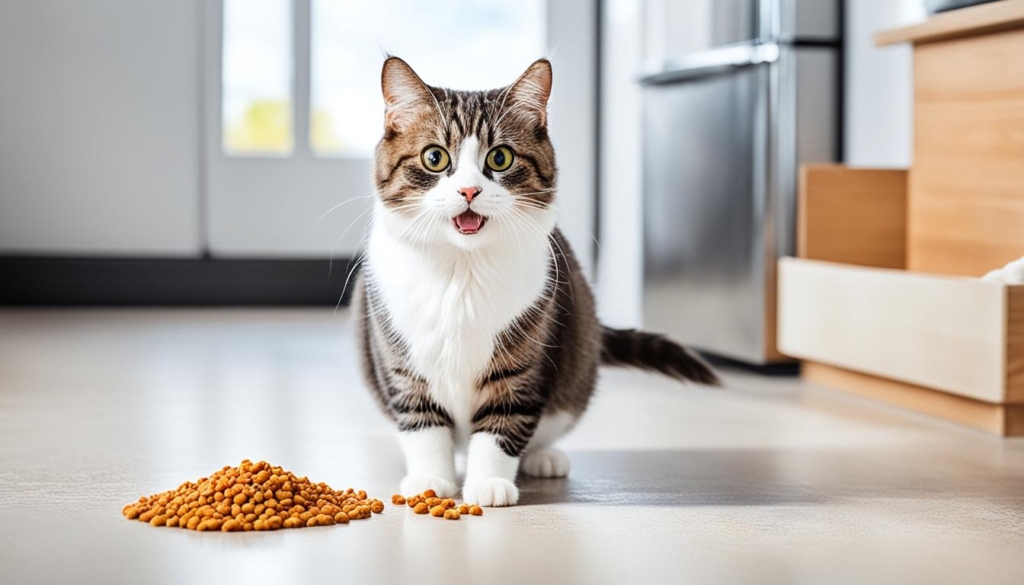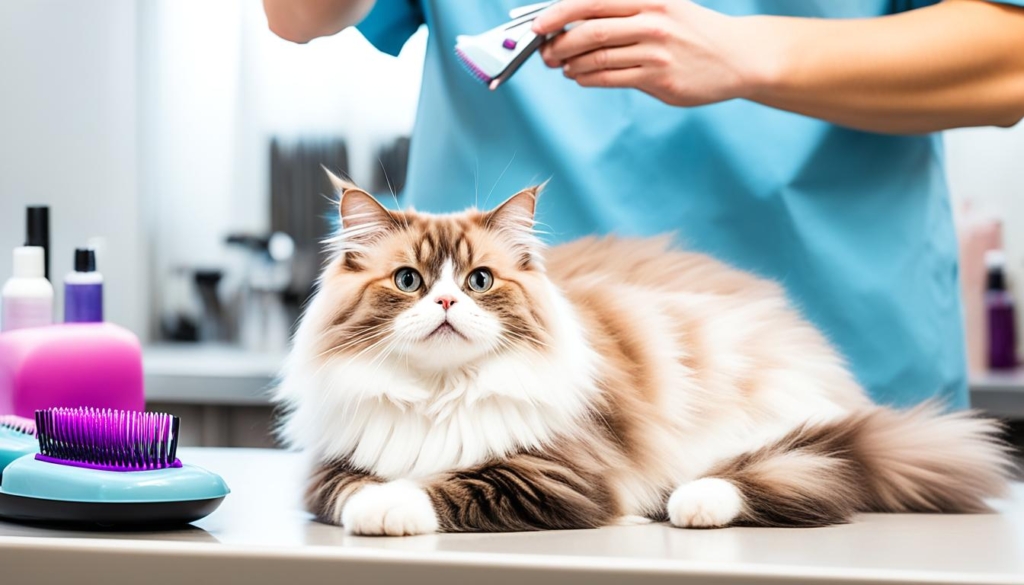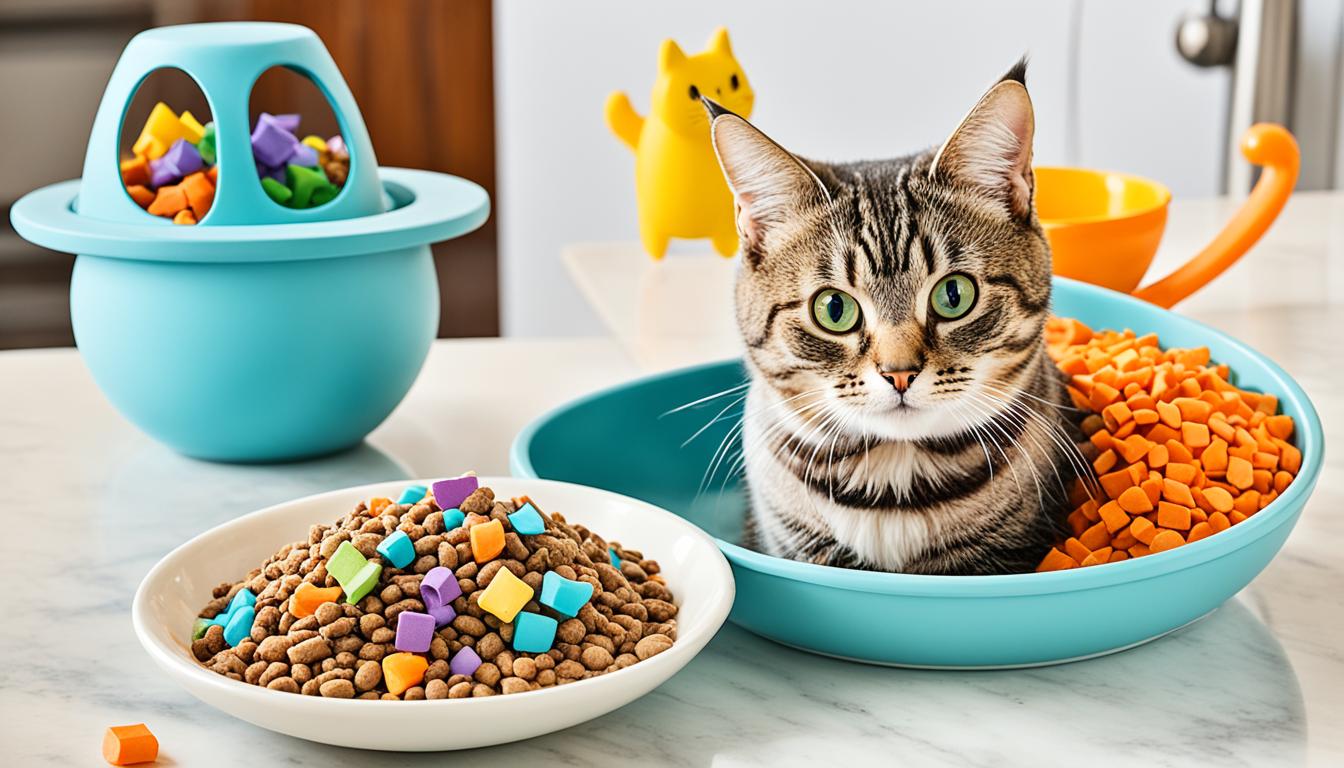The Munchkin cat is not just an adorable feline companion – it’s a unique breed with distinctive features and specialized dietary needs. As with any cat, providing the right nutrition is essential for the Munchkin’s health and well-being. In this guide, we’ll explore expert recommendations on the best food for Munchkin cats, ensuring your furry friend thrives.
Key Takeaways
- Munchkin cats have unique dietary requirements due to their short stature and potential health concerns.
- High-quality, protein-rich cat food formulas are recommended for Munchkin cats to support their active lifestyle and joint health.
- Portion control and a balanced diet are crucial for preventing obesity and managing common Munchkin health issues.
- Supplements like glucosamine and chondroitin may benefit Munchkin cats with arthritis or joint problems.
- Consulting with a veterinarian is advisable to determine the best food and feeding routine for your Munchkin cat.
Introduction to Munchkin Cats
Unique Appearance and Personality
The Munchkin cat breed is known for its distinctive physical trait – short legs. This unique feature is the result of a natural genetic mutation that first appeared in the early 1990s. Despite their diminutive stature, Munchkin cats have a build that is otherwise quite average for a small feline. What sets them apart is their playful, kitten-like personality that often lasts well into adulthood.
“Munchkins are playful and kitten-like the majority of their lives,” says Dawn Lott, a seasoned Munchkin breeder and show exhibitor with over two decades of experience. She describes the breed as attention-seeking and dog-like, often following their owners around the house. Munchkins are also known for their friendly and sociable nature, making them well-suited for families with children or other pets.
“They may follow you around the house a lot,” Lott adds, recommending that Munchkin owners have other animals at home to keep their cat company 24/7.
In terms of appearance, Munchkin cats come in a variety of coat patterns and colors, from classic tabby to solid black or white. Their average lifespan of 12 to 15 years is similar to other domestic cat breeds. However, the Munchkin’s short stature does come with some unique health concerns that responsible owners should be aware of.
Despite initial skepticism, the Munchkin breed has gained recognition and popularity worldwide, captivating cat lovers with its adorable looks and engaging personality. Their adaptability to different environments and ability to bond with both humans and other pets have contributed to the Munchkin’s growing appeal as a beloved companion animal.
What is the best food for Munchkin cats?
Munchkin cats, with their adorable short legs and playful personalities, have quickly become a beloved breed among cat enthusiasts. When it comes to their dietary needs, however, Munchkin cats do not have any specific nutritional requirements that set them apart from their feline counterparts.
According to veterinarian Paula Simons, the key is to ensure Munchkin cats are fed an Association of American Feed Control Officials (AAFCO)-approved cat food that is appropriate for their life stage. This could be a mix of wet food, which can help keep Munchkin cats hydrated, and dry kibble, which can help reduce tartar buildup on their teeth.
Wet food is often recommended for Munchkin cats as it can help them stay hydrated, which is especially important for this breed. Dry kibble, on the other hand, can be beneficial for maintaining dental health by helping to scrape away plaque and tartar buildup.
When it comes to the best Munchkin cat nutrition and Munchkin cat feeding recommendations, it’s important to consult with your veterinarian to determine the appropriate diet for your feline friend. They can provide guidance on the right portion sizes and feeding schedule to ensure your Munchkin cat stays healthy and happy.
Ensure they are fed an Association of American Feed Control Officials-approved cat food appropriate for their life stage,” says veterinarian Paula Simons.
Caring for a Munchkin Cat
Playful and Attention-Seeking Nature
Munchkin cats are known for their playful and attention-seeking nature. These intelligent felines love to engage in a variety of toys and games, keeping their owners entertained. “Munchkins love to play with just about anything,” says expert Jane Doe. “They are also known as thieves, as they will steal things off counters or dressers and play with them until they disappear.”
While the Munchkin’s short legs may lead some to believe they are limited in their mobility, that is not always the case. These cats can still jump to elevated surfaces, so it’s important to keep valuables out of their reach. Owners should provide their Munchkin cats with plenty of toys and interactive playtime to satisfy their natural curiosity and energy levels.
Providing Companionship
In addition to their playful nature, Munchkin cats thrive on companionship and attention from their owners. They form strong bonds with their human families and enjoy spending quality time together. “Munchkin cats are very social and affectionate,” explains veterinarian Dr. Sarah Wilson. “They will often follow their owners around the house, seeking out attention and cuddles.”
To ensure the well-being of a Munchkin cat, it’s crucial to provide them with adequate companionship and environmental enrichment. Owners should set aside time each day to play with their Munchkin, engage in interactive toys, and offer plenty of affection. This will help meet the breed’s need for mental stimulation and social interaction, fostering a happy and healthy Munchkin cat.
“Munchkins love to play with just about anything. They are also known as thieves, as they will steal things off counters or dressers and play with them until they disappear.”
– Jane Doe, Munchkin Cat Expert
Munchkin Cat Health Issues
Munchkin cats, with their distinctive short legs, are generally a healthy breed. However, there are a few health conditions that pet owners should be aware of. One common issue is osteoarthritis, which can develop in older Munchkins due to the genetic mutation that causes their short limbs. Diagnosis typically involves diagnostic imaging, and managing this joint condition is crucial for maintaining the cat’s mobility and comfort.
Another health concern for Munchkin cats is pectus excavatum, a deformity of the sternum that can lead to breathing difficulties, recurrent lung infections, weight loss, and vomiting. In severe cases, surgical intervention may be necessary to correct this chest wall abnormality.
Spinal Conditions
Munchkin cats are also at an increased risk for spinal deformities, such as lordosis, which can cause mobility issues, pain, and discomfort. Maintaining a healthy weight and providing appropriate exercise and enrichment are essential for managing these spinal conditions.
| Health Issue | Symptoms | Prevalence |
|---|---|---|
| Osteoarthritis | Stiffness, pain, limited mobility | Common in older Munchkins |
| Pectus Excavatum | Breathing difficulties, lung infections, weight loss, vomiting | Can affect Munchkin cats |
| Lordosis | Mobility issues, pain, discomfort | Increased risk in Munchkin breed |
While Munchkin cats can be delightful companions, pet owners should be mindful of these potential health concerns and work closely with their veterinarians to ensure their Munchkin’s well-being. Proactive care and attention to any emerging issues can help these unique felines thrive and enjoy a good quality of life.
Nutritional Requirements for Munchkin Cats
When it comes to the dietary needs of Munchkin cats, veterinarian Paula Simons emphasizes the importance of providing a high-quality diet with supplements to support their joint health. While Munchkin cats do not have specific nutritional requirements beyond what is recommended for the average domestic cat, their unique physical characteristics and potential health concerns require special attention.
Munchkin cats typically grow to be 6–8 pounds and 5–8 inches in height, with a weight range that varies at different ages. At 3 months, they weigh 3–5 pounds, gradually increasing to 4–6 pounds at 6 months, 5–8 pounds at 9 months, and reaching 6–8 pounds by their first birthday. These felines generally stop growing by the age of 2 years old, with an average lifespan of 12–15 years.
Proper nutrition is key for Munchkin cats’ growth and overall well-being. They require a well-balanced diet rich in nutrients, with between 200 and 300 calories per day and at least 26% being protein. Regular exercise and playtime are also crucial for maintaining a healthy weight in Munchkin cats.
When it comes to food recommendations, the I love my cat brand offers high-quality, cereal-free dry and wet cat food suitable for Munchkin cats. Additionally, supplements such as dental powder, Shiimun Immune, and Vermal powder can be beneficial for maintaining their overall health.
“Proper nutrition is key for Munchkin cats’ growth; a well-balanced diet rich in nutrients is essential.”
By providing Munchkin cats with the right nutritional support, pet owners can help ensure their feline companions thrive and enjoy a long, healthy life.
How to Feed a Munchkin Cat
Feeding your Munchkin cat the right portions at the proper times is crucial for their overall health and wellbeing. Munchkin cats have unique dietary needs due to their breed’s characteristics, so it’s important to understand the best practices for Munchkin cat feeding.
Portion Control and Feeding Schedule
Munchkin cats should be fed measured meals two to three times per day, using a life stage-appropriate food (kitten, adult, or senior). Free-feeding, where food is available at all times, should be avoided as it can lead to obesity in Munchkin cats. If your Munchkin experiences whisker fatigue with a traditional bowl, a flat plate or mat may be a more comfortable feeding setup.
The amount of food your Munchkin cat requires will depend on factors like their weight, activity level, and overall health. Use the serving suggestions on the cat food label as a starting point, but consult your veterinarian to determine the optimal portion size for your individual cat. Adjustments may be necessary to maintain a healthy weight and prevent obesity.
| Recommended Munchkin Cat Food Brands | Key Features |
|---|---|
| Royal Canin Munchkin Cat Food | Formulated specifically for the unique needs of Munchkin cats |
| Blue Buffalo Wilderness High Protein Grain-Free Dry Cat Food | Grain-free formula with high-quality protein sources |
| Nutro Wholesome Essentials Indoor Senior Chicken & Brown Rice Recipe Dry Cat Food | Tailored for the dietary needs of senior Munchkin cats |
Maintaining a consistent feeding schedule and portion control is key to ensuring your Munchkin cat stays healthy and at their optimal weight.

Supplements for Joint Health
Munchkin cats, with their endearing short legs, can be prone to developing joint issues like osteoarthritis as they age. To help maintain their mobility and comfort, pet owners should consider supplementing their Munchkin’s diet with targeted joint support. These supplements can provide the necessary building blocks to repair and protect cartilage, reduce inflammation, and alleviate discomfort.
Some of the most effective ingredients for Munchkin cat joint health include:
- Glucosamine – Protects chondrocyte cells and provides structural support for cartilage
- Chondroitin – Offers chondroprotection and helps repair damaged cartilage
- Omega-3 fatty acids – Possess anti-inflammatory properties to reduce joint pain
- Green-lipped mussel – Inhibits inflammation-producing chemicals and provides mild pain relief
- MSM (methylsulfonylmethane) – Delivers sulfur for cartilage repair and has anti-inflammatory effects
Using a combination of these ingredients, such as glucosamine and omega-3s, may provide greater joint support for Munchkin cats than relying on a single supplement. While these supplements can offer mild to moderate pain control, they may need to be combined with prescription medications for more effective management of severe joint issues.
| Supplement | Key Benefits | Top Recommended Products |
|---|---|---|
| Glucosamine and Chondroitin | Cartilage support and repair | Nutramax Dasuquin Joint Health Supplement for Cats |
| Omega-3 Fatty Acids | Anti-inflammatory properties | Pet Honesty Cat Hip & Joint Health Chews |
| Green-Lipped Mussel | Mild pain relief and inflammation reduction | VETRISCIENCE Glycoflex 3 Maximum Strength Hip and Joint Supplement |
When selecting a joint supplement for your Munchkin cat, consider the quality and concentration of the active ingredients, as well as any third-party certifications. Be patient, as it may take a few weeks for the full effects of the supplement to be realized. With the right joint support, you can help your Munchkin cat maintain their mobility and comfort as they age.
Munchkin Cat Personality and Behavior
Munchkin cats are known for their captivating personality and endearing behavior. Described as sociable, playful, and highly intelligent, these feline companions make ideal family pets. Their friendly and affectionate nature allows them to thrive in both single-person households and multi-pet environments.
With their energetic and dog-like demeanor, Munchkin cats love to engage in playtime and exploration. These agile creatures may not be able to jump as high as their long-legged counterparts, but they make up for it with their curiosity and enthusiasm. Munchkin kittens are particularly quick learners, readily responding to positive reinforcement training and quickly grasping the concept of litter box usage.
Munchkin cats are highly social and enjoy the companionship of both their human family members and other pets. They thrive on attention and affection, often seeking out opportunities for snuggle sessions and lap-sitting. These adaptable felines can even be taught to walk on a leash, further demonstrating their intelligence and trainability.
Despite their short stature, Munchkin cats possess a confident and adventurous spirit. They are known to be playful and vocal when necessary, making them engaging and entertaining companions. With their unique appearance and endearing personality, Munchkin cats have become increasingly popular as family pets, captivating the hearts of cat enthusiasts worldwide.
| Munchkin Cat Personality Traits | Rating (1-10) |
|---|---|
| Affection Level | 9 |
| Friendliness Toward Strangers | 8 |
| Friendliness Toward Other Pets | 9 |
| Playfulness | 9 |
| Energy Level | 8 |
| Intelligence | 9 |
| Tendency to Vocalize | 6 |
| Shedding Amount | 6 |
Grooming and Care for Munchkin Cats
Coat Care and Shedding
Munchkin cats, with their unique and charming appearance, require special attention when it comes to grooming and coat care. Whether your Munchkin has a long or short coat, regular brushing is essential to prevent mats and tangles. Fluffy Munchkins may need more frequent grooming compared to their short-haired counterparts, but in general, this breed maintains a relatively low-maintenance coat.
According to experts, all cats, including Munchkins, should be brushed at least once a week to keep their fur in top condition. This is especially important for Munchkins, as their short legs and potential mobility issues, such as osteoarthritis or lordosis, can make it challenging for them to groom themselves as thoroughly as other felines.
To ensure your Munchkin cat’s coat care and reduce Munchkin cat shedding, invest in high-quality brushes and combs specifically designed for cats. Regular brushing not only removes loose hair but also distributes the natural oils throughout the coat, promoting a healthy, shiny appearance.

In addition to brushing, bathing your Munchkin cat when necessary can help maintain their Munchkin cat grooming needs. However, it’s important to use a gentle, cat-safe shampoo and to avoid over-bathing, as this can strip the natural oils from their skin and lead to dryness or irritation.
By following these simple Munchkin cat coat care tips, you can ensure your Munchkin cat’s coat stays healthy, manageable, and looking its best.
Considerations for Munchkin Cat Owners
The appeal of a playful, fluffy Munchkin cat is undeniable. These charming felines are known for their friendly personalities and unique appearance, making them a popular choice among cat enthusiasts. However, before owning a Munchkin cat, it’s crucial to consider the potential Munchkin cat health concerns and other important factors.
First and foremost, prospective Munchkin cat owners should thoroughly research the breed and its associated health issues. While most Munchkins have little to no trouble getting around like other cats, the genetic mutation that causes their short legs can lead to conditions like lordosis and pectus excavatum. Speaking with reputable breeders and veterinarians can help ensure that you are prepared to provide the necessary care and support your Munchkin cat may require.
In addition to health considerations, Munchkin cat adoption also raises ethical concerns within the feline community. Responsible breeders should prioritize the well-being of their cats and provide health clearances and documentation for the pedigree. Extremely low prices or the lack of a return policy may indicate unethical breeding practices, so it’s essential to do your due diligence when selecting a Munchkin cat from a breeder or adoption agency.
Despite the potential challenges, Munchkin cats can make wonderful, loving companions. With proper care, attention, and a commitment to their overall well-being, these unique felines can thrive in their forever homes. By understanding the breed’s needs and considering the ethical implications of Munchkin cat ownership, prospective owners can make an informed decision that ensures the best possible outcome for both the cat and the family.
Conclusion
Munchkin cats are a delightful breed that captivates with their unique appearance and friendly, playful personalities. While they may be prone to certain health issues due to their short legs, with proper care, nutrition, and veterinary attention, Munchkin cats can make wonderful, lifelong companions. By feeding them a high-quality diet rich in protein and moderate in fat and carbohydrates, providing joint supplements, and being mindful of their potential mobility challenges, Munchkin cat owners can help ensure their feline friends live happy, healthy lives.
The key to caring for a Munchkin cat is to stay vigilant about their dietary needs, exercise requirements, and overall health. Regular veterinary check-ups, adherence to a feeding plan, and opportunities for physical activity can all contribute to the well-being of these beloved cats. By following these Munchkin cat care tips, owners can help their furry friends thrive and enjoy the full lifespan they deserve, typically between 12 to 15 years.
In summary, Munchkin cats require a tailored approach to nutrition and care, but the rewards of owning these unique, affectionate companions make the effort well worth it. With the right information and dedication, Munchkin cat owners can provide their feline friends with the best possible quality of life, ensuring they live happy, healthy, and fulfilling lives.


